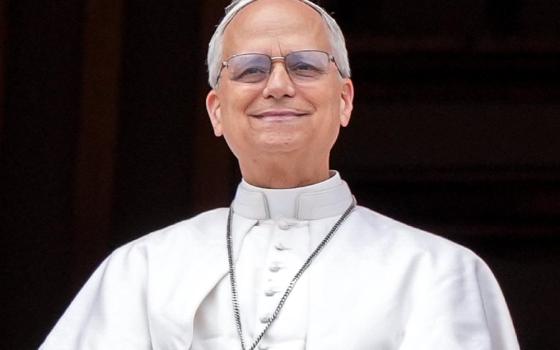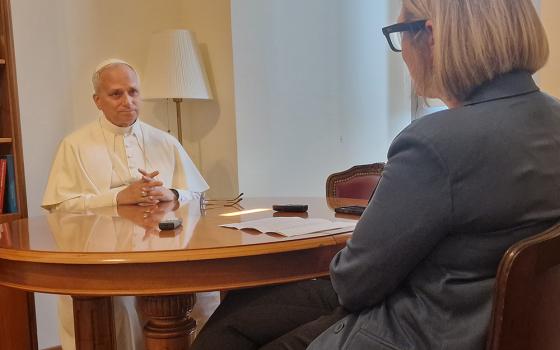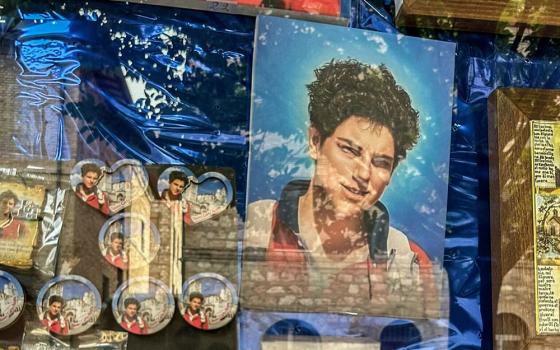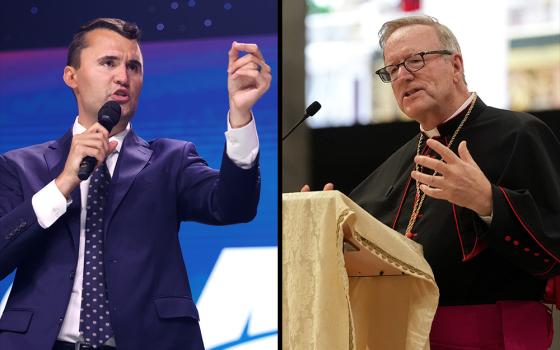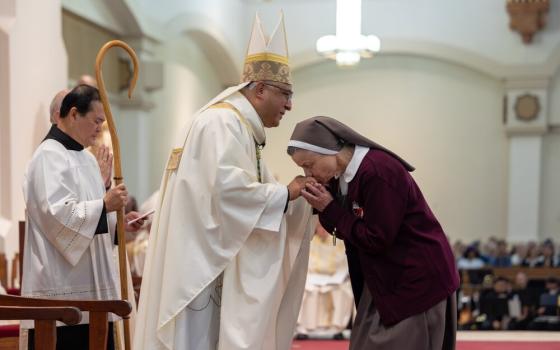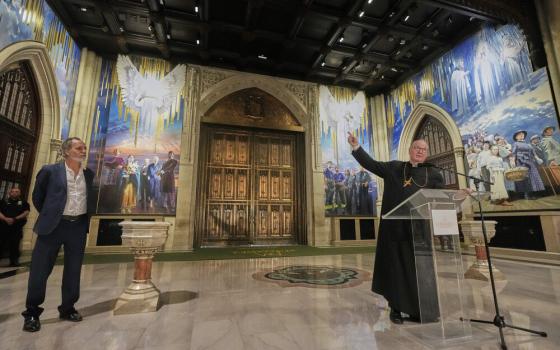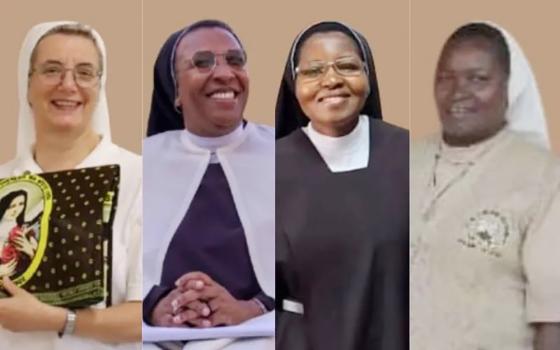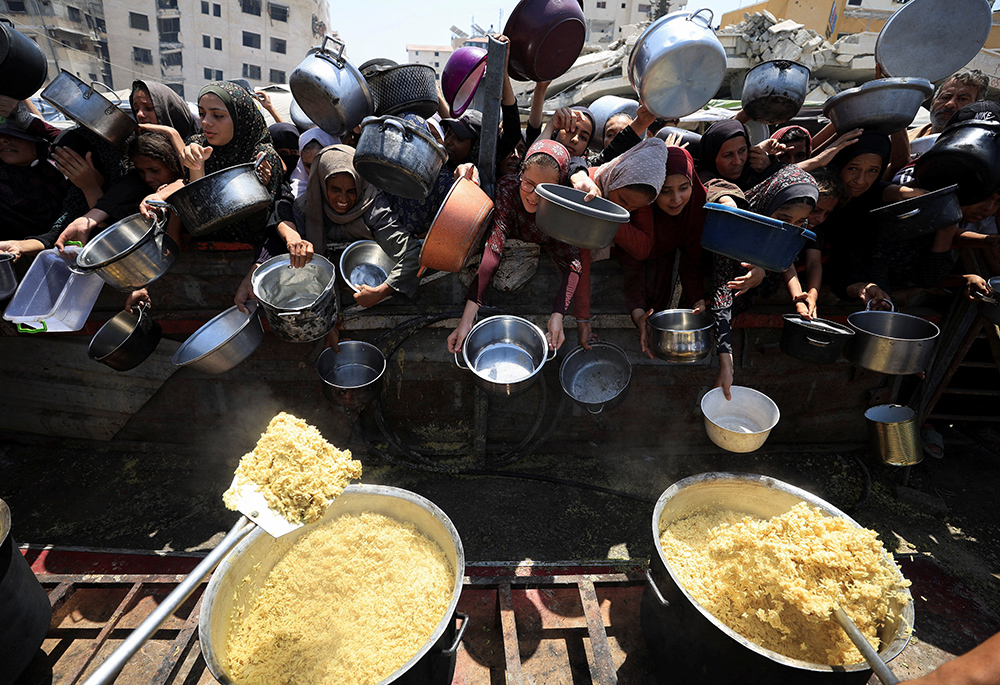
Palestinians wait to receive food from a charity kitchen in the Gaza Strip's Gaza City Aug. 15, 2025. (OSV News/Reuters/Dawoud Abu Alkas)
After nearly two years of devastation, Gaza City has now officially been declared in a state of famine.
The Associated Press reported that "the Integrated Food Security Phase Classification, or IPC, said famine is happening in Gaza City, home to hundreds of thousands of Palestinians, and could spread south to Deir al-Balah and Khan Younis" by the end of September. According to AP, the IPC report said that more than half a million people in Gaza "face catastrophic levels of hunger, with many at risk of dying from malnutrition-related causes."
Children's arms are measured and found wasted, their growth stunted, their cries muted by exhaustion. Adults collapse from weakness. Families count the days since they last tasted fruit. Hunger has become the air they breathe.
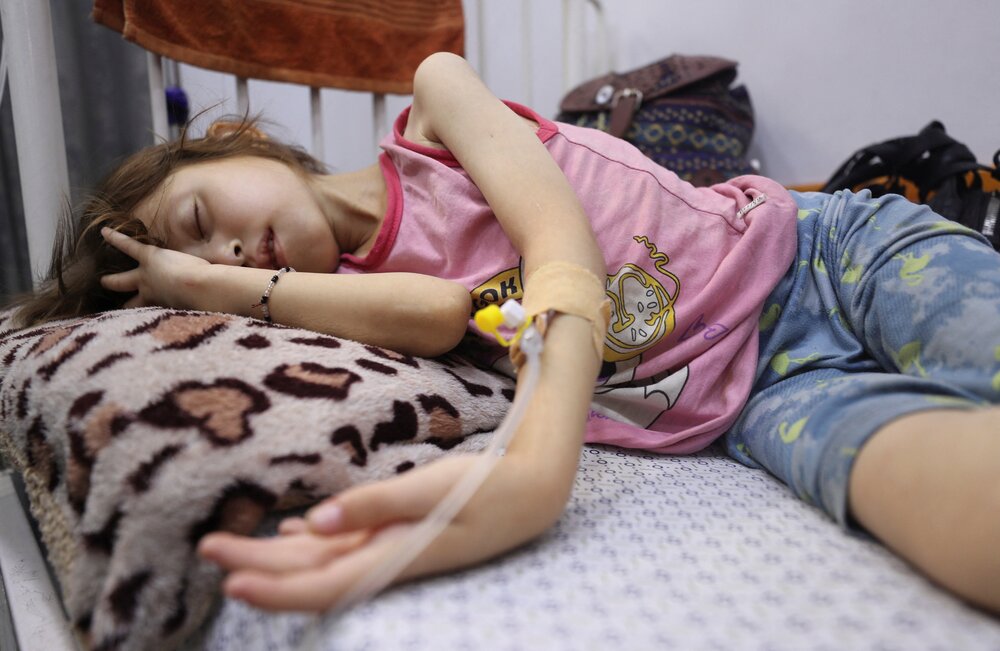
Young Palestinian ana Ayad, who is malnourished, according to medics, lies on a bed July 29, 2025, as she receives treatment at a hospital in Gaza City, Gaza Strip, amid a worsening hunger crisis. (OSV News/Reuters/Mahmoud Issa)
Famine is never only about empty stomachs. It is about choices; about power, about whose bodies are allowed to wither. In Scripture, famine was often linked not to drought alone but to injustice: to violence, to a broken treaty, or to the spilling of innocent blood. When this happened, the land itself was defiled, showing how disregard for human life could unravel not only relationships but the very fertility of the soil.
Israel once endured such a famine. For three years the land yielded nothing, and David sought God for the reason. The answer reached back generations: Long before, Israel had sworn an oath in Joshua's time to spare and protect the Gibeonites (Joshua, Chapter 9). But Saul broke that covenant, attempting to annihilate them in his zeal for Israel. Because he shed innocent blood, the nation as a whole bore the consequences.
In desperation, David turned to vengeance. To appease the Gibeonites, he handed over seven of Saul's descendants to be executed. Among them were Rizpah's two sons. Their bodies were left hanging in the open air, rotting under the sun; exposed, humiliated and unburied, a deep dishonor in Israelite custom.
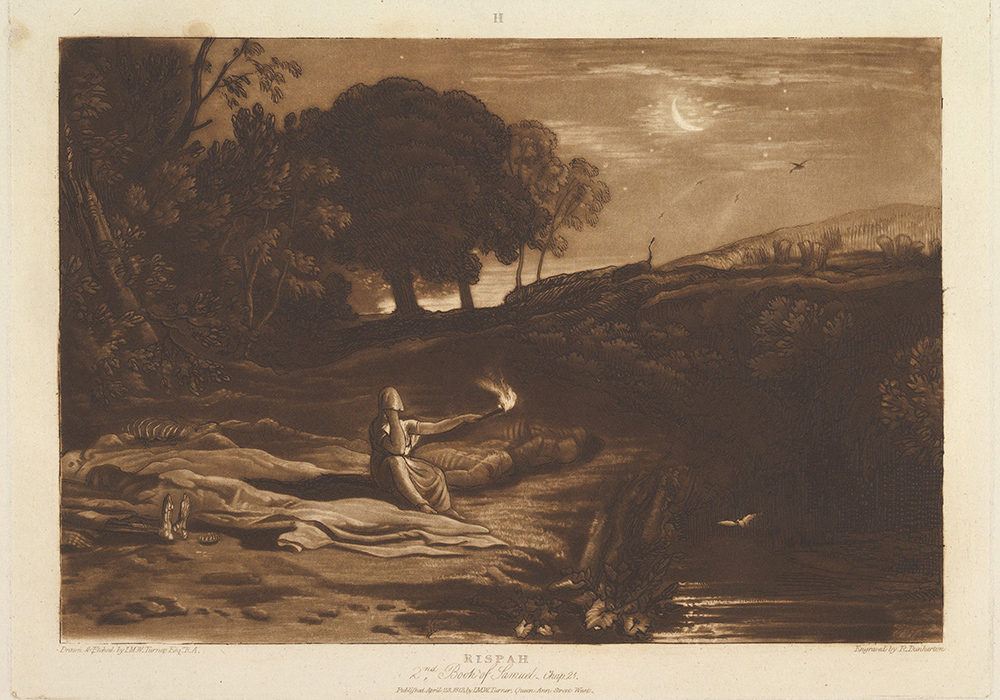
"Rispah, 2nd Book of Samuel, Chapter 21, part IX, plate 46" from "Liber Studiorum," ("Book of Studies") an April 23, 1812, British print designed and etched by Joseph Mallord William Turner, engraved by Robert Dunkarton; the Metropolitan Museum of Art says, "After the death of King Saul, his sons by his concubine Rizpah were executed by the Gibeonites, and left unburied. Their mother here protects the corpses, using a torch to ward off an approaching lion at night. The letter 'H' in upper margin indicates Turner's category of Historical landscape." (Courtesy of Metropolitan Museum of Art)
Here the narrative slows to introduce Rizpah, a woman history might have forgotten were it not for her defiance. She was a concubine of King Saul, a mother whose children were stripped from her by political vengeance, a widow left without protection or status. In the eyes of the powerful, she was expendable. Yet when her sons were executed and their bodies left to decay, dishonored and abandoned, Rizpah refused to turn away.
Here the famine grows layered. The people hungered for bread. Rizpah hungered for justice. She had lost her children, her security, her standing in society. She may have been destitute and disgraced. The land groaned, the people starved and Rizpah herself became famine embodied. And yet she did not vanish into despair. She rose into protest.
"From the beginning of the harvest until rain came down on them from the heavens," Rizpah spread sackcloth on a rock and kept vigil over the corpses of her sons; swatting away vultures by day, fending off wild beasts by night. I imagine her skin cracked and parched, her throat hoarse from screaming, her body trembling as hunger and grief gnawed at her.
And yet she stayed. Her presence was defiance; her watch a sermon to a nation. Rizpah could not resurrect her children, but she could bear witness. She could insist that their memory, and their dignity, not be devoured in silence.
It was not David's political theater, not his blood-for-blood logic, that made the rains fall. No, it was Rizpah. Her persistence, her refusal to let the bodies of the slain be forgotten, shook the king into action. Only when David heard of her vigil and ordered the bodies to be buried properly, with honor, did the skies finally open. The famine broke not through vengeance, but through justice: only when wrongs were acknowledged and dignity was restored.
Advertisement
And here we are again, witnessing famine not as an accident but as a weapon. Gaza's hunger is not a mystery of the heavens; it is a project of blockade and denial. The land could be fed — warehouses of food sit just beyond the border — but the people are starved by design. Mothers rock skeletal children, their ribs sharp against thin skin. Fathers risk death to lunge at aid trucks for scraps of rice. Aid convoys are swarmed, often amid gunfire, often looted in desperation. Every day is a battle with hunger, every day dignity is stripped away. The experts tell us plainly: this famine is man-made. It could be halted and reversed if aid were allowed to flow freely. But instead, it is permitted to spread, choking life from a people already displaced and bombarded.
Like Rizpah crying out beneath the blistering sun, Gaza's vigil is a protest against the world's indifference. It is a testimony that God is not moved by siege or political performance, but by justice, mercy and the refusal to look away from violated bodies.
Rizpah's act was more than grief; it was survival. For her people. For the land. For a nation gasping for food, and for a God who listens not to kings but to the cries of the wronged. Rizpah's protest became the turning point that nourished Israel again; her body became an altar of defiance and liberation, and because of her, the rains fell.
Famine is not inevitable. It is constructed. And if it is constructed, it can be dismantled. The rains fall only when dignity is restored, when mercy is chosen over violence, when the cries of mothers are heeded. The question before us is not whether the skies will open, but whether we will. Whether we will demand an end to the siege. Whether Gaza will flood not with bombs but with bread. Whether we will stand with Rizpah, refusing to let bodies be desecrated, refusing to let lives be devoured.
The time for hesitation has passed. Starvation is here. And the call of God resounds still: Choose life. Let the rains fall again.

